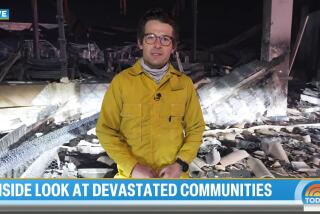Reporting Largely Restrained in Coverage of Horrific Scenes
- Share via
Even as George W. Bush was initially kept from risky Washington, America’s presidents of the airwaves were right where they were expected to be early Tuesday, addressing the nation in admirably measured tones about the epic television images of our time.
“You are looking at live pictures of the second tower of the World Trade Center collapsing,” said NBC’s Katie Couric coolly as the 110 stories of steel, concrete and glass crumbled in an explosion of dust and debris that sent pedestrians running and blanketed lower Manhattan into something of a white-ash nuclear winter.
Equally shocking was footage of a hijacked airliner slamming into the south tower and torching it like a Roman candle after another hijacked jet had crashed into that other skyscraper, apparently in coordination with a third hijacked passenger plane that dived into a helipad aside the Pentagon in Arlington, Va., raising fears for the government’s safety.
If some newscast titles seemed to have the entire U.S. “under attack,” the reporting was largely restrained on this catastrophic morning in which network anchors earned their millions by reporting calmly about calamity to a nation that takes many of its cues from media authority figures.
“The word of the day is steady, steady,” said Dan Rather on CBS shortly after 7 a.m., when his own stomach must have been churning. “We are going to try to separate the rumors from the facts,” he added. “This is a day when rumors are going to spread like mildew in damp basements.”
There is a pattern to TV’s coverage of such breaking stories. First the terror, then the talk.
So staying mildew-free wasn’t easy, as the drumroll for retaliation that began faintly in the morning grew ever louder by early afternoon, even though Rather had cautioned “no one knows who’s responsible” for what happened and NBC’s Tom Brokaw warned against “stereotypical attacks.” Noting the rage many Americans were feeling about the thunderbolt of terrorism piercing their cocoon of false security, some anchors recalled how early reports from the Oklahoma City federal building bombing erroneously had held Arabs responsible.
Late in the afternoon, however, all news operations but the Fox News Channel picked up a live report with pictures from CNN’s Nic Robertson in Kabul, Afghanistan, saying that explosions were occurring in that capital city.
Did that mean the U.S. had launched a retaliatory strike against the Taliban government said to have harbored and given support to Osama bin Laden, the terrorist leader that many were already blaming for the deadly New York and Washington attacks? No one seemed to know.
The rest of the day spoke for itself.
Whether Couric’s monotone, Rather, NBC’s Brokaw, ABC’s Peter Jennings or CNN’s newest anchor, Aaron Brown, the motif was restraint, these seasoned hands realizing that careless words could panic Americans relying mostly on television to inform them if the U.S. was at war. And if so, against whom?
Pictures of suffering were almost surreal, at some points capturing bodies being blown from exploding towers along with debris, and tiny specks of humanity tragically leaping to their deaths just ahead of the flames. It was a case of life seeming to imitate the special effects of bad movies, whether grisly deaths of “Towering Inferno” or the aliens of “Independence Day” hovering above the U.S. with plans to attack the president.
NBC gave an especially strong account of the grim chaos on the ground, its reporters stripping back layers of grisly reality. One of them came into the studio as whitishly alabaster as other New Yorkers pelted by bits of wreckage, their hair lightened by dust as if they had aged years in hours.
Thousands of others had died. “I’ve seen several bodies go in,” NBC’s Robert Bazell reported from outside St. Vincent’s Hospital, where some victims were being given last rites on the pavement.
On Fox News, someone reported seeing a woman pushing a baby carriage on the run, just ahead of a cloud “billowing their way.” And CBS’ Harold Dow recalled fleeing the second building’s collapse: “I was running for my life, and people behind me were running. I don’t think a lot of them made
it.”
It was a day also for straight talk, as in Jennings faulting the “intelligence community” for not foreseeing the danger to the U.S. from domestic terrorism through hijacking, and CNN’s Jeff Greenfield speaking of this as the day “America’s luck ran out.” There was room, too, for eloquence, as in Brokaw saying, “We’re vulnerable because of the things that make us so great.”
Above all, it was a day when TV did itself proud, this time the dust and debris not coming from the mouths of those covering the story.
More to Read
The biggest entertainment stories
Get our big stories about Hollywood, film, television, music, arts, culture and more right in your inbox as soon as they publish.
You may occasionally receive promotional content from the Los Angeles Times.










